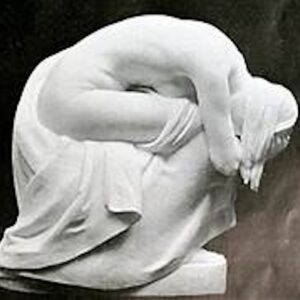His face was one estranged from what he knows.
What would you see if you were to look at my face about thirty minutes into a forty-minute period of sitting meditation practice? That’s about when I start to get restless.
Entering my study, you would first see me from behind on my meditation bench, knees folded under and resting on a royal blue zabuton, a short stack of Jewish prayer books beside me, before me a three-shelf bookcase full of slim volumes of spacious poetry, just above it a window looking out on a late winter Red Maple, White Oak, and three Wild Cherry trees, and beyond those trees and the woods behind my house the northern face of Patton Mountain.
You’d see a seated, still body, which you might read as ease.
But in my mind there’s a lot of activity. When will the bell ring? Hasn’t it been forty minutes? Surely it’s been forty minutes. Did I make a mistake and set the timer for four hundred minutes instead of forty? What if this goes on forever? What if I forgot to set the timer altogether? I should open my eyes and check. After all, I have already experienced what I’d hoped for when the practice period began, a little settling of the mind, a few moments of concentration, even an insight or two. But If I open my eyes now, I’ll be a failure. That’s what I think.
Were you to look at my face now, would you see any sign—furrowed brow, throbbing temples—of what I am experiencing within: doubt, loss of control, and anxiety and fear that results from that? Would you see a face of “one estranged from what he knows,” or, more accurately in this case, the face of one encountering what he doesn’t know, namely, exactly how many minutes are left in a sitting period?
Of course, the stakes are greater in the ancient Mesopotamian epic Gilgamesh for a hunter and his father, when he sees his son’s face—”estranged from what he knows”—after the son returns from an encounter with the wild man Enkidu.
First the father sees; then the son explains (here in David Ferry’s translation):
“Father,
I saw a hairy-bodied man today
at the watering place, powerful as Ninurta
the god of war; he feeds upon the grasslands
with gazelles; he visits the watering places
with the beasts; he has unset my traps and filled
my hunting pits; the creatures of the grasslands
get away free. The wild man sets them free.
Because of him I am no longer a hunter.”
The son’s encounter triggers an existential crisis: “Because of him I am no longer a hunter.” If I am not who I am, then who am I?
Seeing his son in this condition, the father, understandably, wants to restore the hunter to himself as well as to the world he knew before this encounter with “the wild man.” So he instructs his son to report what he has seen—”the power of the wild man”—to Gilgamesh and to ask Gilgamesh to send a harlot with the hunter back to Enkidu. She will “conquer him [Enkidu] / with her greater power.” The father knows not only how to tame, how to civilize Enkidu, but also how to return the world to the way it was known before.
Narratively, the hunter’s story serves as the necessary event that results in Enkidu’s meeting Gilgamesh and the beginning of the great friendship at the heart of the epic. This moment also represents one way of reacting to the human encounter with the unknown.
When we encounter something—a person, a situation, an idea, a culture—that exists on its own terms beyond the world as we know it, we might leap into action to do whatever it takes to bring that world into line with the world as we believe it should be. And how can we accomplish that? Master or destroy what we perceive as alien and threatening. That’s the reaction we see in this little episode in Gilgamesh.
Are there other ways of responding to what’s unknown? Might we even train ourselves to recognize the human mind’s habit of perceiving as threats those things, human and more than human, that do not conform to the world as we know it? In “Carmel Point,” Robinson Jeffers implores us to “uncenter our minds from ourselves” that we may come to know fields as fields, cliffs as cliffs, ocean as ocean and that, perhaps, we may even come to know ourselves as we are known by fields, cliffs, and ocean.
Carmel Point
The extraordinary patience of things!
This beautiful place defaced with a crop of suburban houses—
How beautiful when we first beheld it,
Unbroken field of poppy and lupin walled with clean cliffs;
No intrusion but two or three horses pasturing,
Or a few milch cows rubbing their flanks on the outcrop rockheads—
Now the spoiler has come: does it care?
Not faintly. It has all time. It knows the people are a tide
That swells and in time will ebb, and all
Their works dissolve. Meanwhile the image of the pristine beauty
Lives in the very grain of the granite,
Safe as the endless ocean that climbs our cliff. —As for us:
We must uncenter our minds from ourselves;
We must unhumanize our views a little, and become confident
As the rock and ocean that we were made from.
Jeffers doesn’t tell us how to “uncenter our minds from ourselves.” Maybe the very act of reading poetry creates conditions in which we’re more likely to experience such uncentering. I know that’s what I experience when reading poetry. Meditation and prayer practice also help me cultivate a way of knowing and being in which my views are unhumanized a bit, in the sense that from time to time I become aware of the limitations of my human mind and experience a more expansive way of knowing. That’s when confidence kicks in. For a moment I no longer experience as a threat that which is beyond the world as I know it. Rather, I experience it with eyes of wonder. The world is bigger than I knew. Thank God for that. Thank God for the rock and ocean and wildness we were made from.
Richard Chess directed the Center for Jewish Studies at UNC Asheville for 30 years. He helps lead UNC Asheville’s contemplative inquiry initiative. He is a board member for the Center for Contemplative Mind in Society. He’s published four books of poetry, the most recent of which is Love Nailed to the Doorpost. You can find him at http://www.richardchess.com





